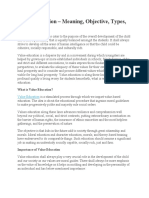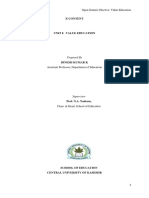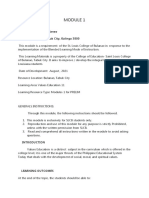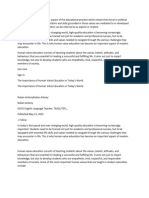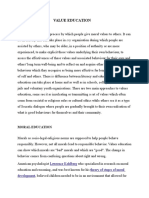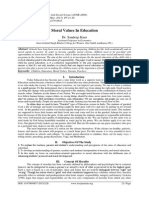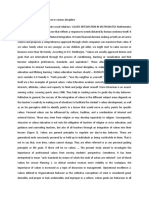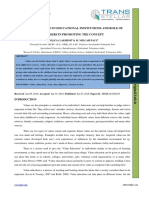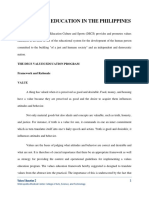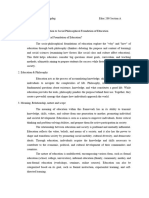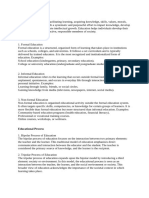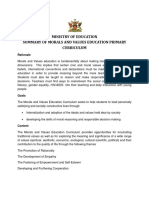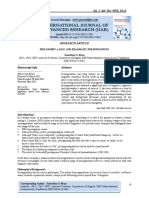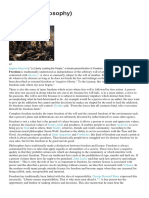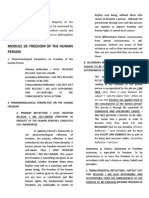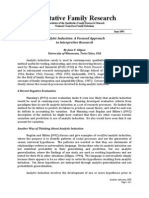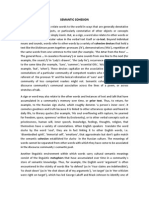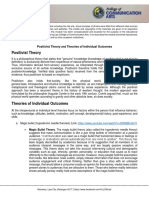Valed
Valed
Uploaded by
JackCopyright:
Available Formats
Valed
Valed
Uploaded by
JackOriginal Description:
Original Title
Copyright
Available Formats
Share this document
Did you find this document useful?
Is this content inappropriate?
Copyright:
Available Formats
Valed
Valed
Uploaded by
JackCopyright:
Available Formats
INTERNATIONAL JOURNAL OF RESEARCH CULTURE SOCIETY ISSN: 2456-6683 Volume - 1, Issue - 5, July - 2017
VALUE BASED EDUCATION AND METHODS, STRATEGIES,
APPROACHES TO IMPART IT IN EDUCATION
CHAITANYA M.
HIGH SCHOOL MATHEMATICS TEACHR, MATHEMATICS, NOGALES HIGH SCHOOL, ARIZONA, USA.
Email - chaitanyamekala2017@gmail.com
Abstract: Since every person belongs to the family of humanity certain basic values which are accepted
universally. Without these basic values the character would be lacking in certain primary traits. The basic value
are essential to profound a character just like the foundation to the building .Without foundation the building
would not stand, so also without basic values we cannot build a sound character. Education has a fundamental
role to play in personal and social development. Value education should become the corner stone of the
educational system and moral upliftment of younger generation. On one hand it is the need of the hour and on the
other hand the edifice of educational reconstruction to build up individual personality with all good and possible
values attached to it. The present paper is an attempt to state what is value education, its need , concept ,
approaches, strategies to impart it in education system so that the future generations will nourish high ideals and
values in the development of the society and the role of teacher in imparting values.
Key words: Value based education and its concept, socialised techniques, social attitude, National curriculum
frame work for education (2000).
1. INTRODUCTION:
Values education is the process by which people give values to others. It can be an activity that can take place in any
organisation during which people are assisted by others, who may be older, in a position of authority or are more
experienced, to make explicit those values underlying their own behaviour, to assess the effectiveness of these values
and associated behaviour for their own and others' long term well-being and to reflect on and acquire other values and
behaviour which they recognise as being more effective for long term well-being of self and others.
Another definition of value education is "learning about self and wisdom of life" in a self exploratory, systematic and
scientific way through formal education.
Values education can take place at home, as well as in schools, colleges, universities, jails and voluntary youth
organisations. There are two main approaches to values education, some see it as inculcating or transmitting a set of
values which often come from societal or religious rules or cultural ethics while others see it as a type of Socratic
dialogue where people are gradually brought to their own realisation of what is good behaviour for themselves and
their community. values education can address to varying degrees are character, moral development, Religious
Education, Spiritual development, citizenship education, personal development, social development and cultural
development.
2. CONCEPT OF VALUE EDUCATION:
Value education means inculcating in the children a sense of humanism, a deep concern for the well being of others
and nation. Value education does not mean value imposition or value indoctrination. Value education teaches us to
preserve what is good and worthwhile in what we have inherited form our culture Value education has capacity to
transform a diseased mind into a fresh, young, innocent healthy natural and attentive mind. The transformed mind is
capable of higher sensitivity and heightened level of perception. It helps us to accept respect the attitude and
behaviour of those who differ from us. The term values is often used to refer to the principles and beliefs which act as
general guides to behaviour and enable the individual to judge what is desirable and what is not. It is necessary to
teach values in the formative years and no child is born with such knowledge. The phrase `Value Education' as used in
the area of school education refers to the study of development of essential values in pupils and the practices
suggested for the promotion of the same. In its full range of meaning, value education includes developing the
appropriate sensibilities moral, cultural, spiritual and the ability to make proper value judgment and internalize them
in one's life. It is an education for `becoming' and involves the total personality of the individual. Value education is
essentially `Man Making' and `Character Building'.
3. NEED FOR VALUE BASED EDUCATION:
The National Curriculum Frame work for school education (2000) placed importance on the need to develop qualities
as regularity, punctuality, cleanliness, self control, industriousness, sense of duty, desire to serve, responsibility,
Available online on - www.ijrcs.org Page 6
INTERNATIONAL JOURNAL OF RESEARCH CULTURE SOCIETY ISSN: 2456-6683 Volume - 1, Issue - 5, July - 2017
enterprise , creativity, sensitivity to greater equality, fraternity democratic attitude and sense of obligation to
environmental protection. Education that builds these fundamental values is essential. Value-based education
promotes a thought provoking and interactive environment for the students through the values incorporated in the
curriculum. It promotes quality education and holistic development of each child for a bright future.
Value based education instils educational and cultural values among students and aims at achieving multi-faceted
development of a human being namely intellectual, physical, spiritual and ethical development. The values
incorporated in a value-based curriculum may include cooperation, responsibility, happiness, simplicity, unity, peace,
respect, love, tolerance, honesty, humility, and freedom. The main purpose of holistic education is to prepare students
to meet the challenges of living as well as academics. Education can be considered as a means to impart general and
specific information; teaching skills and most importantly inculcate values. Education should be a process of
acquiring true knowledge. In planning for good values and objectives, the teacher and student will have to cooperate
and work together. The purpose of education is to strengthen character in the younger generation which is an answer
to many of the problems that face people today. It can bring about a widespread renewal of individual commitment to
an active life of principle and this renewal is imperative. Values like truth, right action, love, peace and non violence
include in a balanced way the profound moral insights of the great civilizations.
4. OBJECTIVES OF VALUE BASED EDUCATION:
All aims of education are invariably rooted in values.
To provide realistic and broad based understanding of human values and educate students to become
responsible citizens in their personal and social life.
To develop and promote the values such as truth, humility, honesty, perseverance, cooperation, compassion,
love etc
To enable students understand, appreciate, uphold, protect and promote the sovereignty, unity and integrity of
India.
To develop spirit of scientific inquiry and scientific temper and capacity for original and independent
thinking.
To offer science education conducive to the development of physical, intellectual , moral, social , spiritual and
economic aspects of life.
To enable students to distinguish between good and bad, right and wrong.
To develop respect for the dignity of the individual and society.
5. TYPES OF VALUES AND ITS NATURE:
Dr Gawande (1994)tried to investigate types of value and their aras. He noticed the following types of of value and
their areas:
Type of value Area of value
Human value Human behaviour
National or constitutional value Constitutional rule
Social value Rules about society
Vocational value Ideals in various professions
Religious value Ideals related to religious
Aesthetic value Value in arts and literature
6. METHODOLOGIES AND TECHNIQUES:
The field of value education is as broad as life itself and touches every aspect of human life, personality and
education. Whether or not they offer specific programs, educational institutions provide some kind of value education.
In many institutions, the curriculum of value education is formal and direct, while in large majority of schools it is
informal and indirect. What makes learning and acquisition of values different form other aspect of school curriculum
is that learning of values cannot be reduced and restricted to classroom instruction alone. The pupils learning of
values in the school is a continuation of their learning in their family, community and through mass media. Therefore,
the school should take into cognizance and utilize all types of social and educational influences affecting the
development of values in pupils for value education purpose.
The methods and strategies of value education are many and varied the selection of, which depends much upon the
values chosen, sources of development of these values and many other limiting factors. The entire school curriculum
function as an important sources of value education. The democratic practice and activities sponsored though a
student self government contributes effectively for value learning. There is no way in which children can avoid
Available online on - www.ijrcs.org Page 7
INTERNATIONAL JOURNAL OF RESEARCH CULTURE SOCIETY ISSN: 2456-6683 Volume - 1, Issue - 5, July - 2017
catching values and attitudes form their teachers. Values education in schools, therefore, is effected through direct,
indirect, incidental methods. Values get transmitted via both the implicit or hidden and planned curriculum.
The following methods and techniques may be suggested.
6. 1.Classroom learning activities methods/approach
These strategies should be used with any of the following sources of value education (a) Biographies (b) Stories (c)
Extracts form essays, articles, classics and news paper (d) Parables, proverbs, quotations and poems (e) value/moral
dilemmas (f) classroom incidents/anecdotes/ conflicts.
6. 2. Practical activities method
The essence of practical approach is that they provide the learners with suitable opportunities to practice and live their
lives according to the principles and values they have perceived and understood. A sound program of value education
may include a combination of a few or all activities mentioned below-
(a) School campus/classroom maintenance activities (b) Social forestry/community development activities (c) Work
experience related activities (d) Organizing campaigns on community sanitation, literacy, environmental awareness,
AIDS prevention awareness (e) Yoga, meditation and prayer sessions (f) eradication of social evils campaign
activities (gender inequality, dowry, alcoholism…) (g) co _ curricular/self government activities
6. 3. Socialized techniques and activities
A variety of group oriented techniques may be used in value education. The effectiveness of the social experiences
planned to promote healthy development among children could be increased with the better understanding of social
role playing.
Socialized strategies for value education purpose are listed below-
a. Dramatization activities like staging play, dramas, both of traditional folk and modern on value themes. b. Enacting
opportunities to take up and practice the role of different kinds, taking the role form epics/scriptures. c. Modeling
exercise, the ideal persons and groups on themes such as 1) gender inequality 2) problems pertaining to women's role
and education 3) caring animals and human beings 4) problems related to environmental protection 5) consequences
of air water pollution
6. 4. Incidental learning method
An incident is an episode or experience in the life of an individual or group. It consists in identifying the wrong or
right actions of an individual or group, either pre-planned to occur or observed by accident, and reprimanding or
rewarding those concerned.
7. APPROACHES TO VALUE BASED EDUCATION:
Douglas Supreka (1976) outlines eight different approaches to value Education, which may be briefly stated as under:
7. 1. Evocation Approach: The students are encouraged to make spontaneously free, non-rational choices, without
thought or hesitation. It provides an environment which allows maximum freedom for students, and provide a
provocative situation for which spontaneous reactions are elicited . For example, The reaction to a picture of starving
children.
7. 2. Inculcation Approach: Students are forced to act according to specific desired values. A positive and negative
reinforcement by the teacher helps value inculcation. This can be done by a teacher's natural actions and responses.
This time honored method has been notably unsuccessful.
7. 3. Awareness Approach: This approach helps students to become aware and identify their own values. The
students are encouraged to share their experiences. The teacher presents value laden situations or dilemmas through
readings, films, role playing, small group discussions and simulation. Students thus engage themselves in the process
of making inferences about values from the thoughts, feelings, beliefs or behavior of themselves and others.
7. 4. Moral Reasoning Approach: Kohlberg's theory of six stages of moral development is the framework most
frequently used in this approach. The teachers setup learning experiences which will facilitate moral development.
These experiences fall under the general category of what Kohlberg calls role taking. The critical factor in role taking
is empathy. Through placing themselves in a role and experiencing the process of deciding, students can begin to see
moral decisions in a larger framework than their single point of view. It consists of the students discussing a dilemma
and by reasoning they attain a higher level of knowledge. In this way by discussion and reflection students are
encouraged to express a value position rather than compromise on a consensus.
Available online on - www.ijrcs.org Page 8
INTERNATIONAL JOURNAL OF RESEARCH CULTURE SOCIETY ISSN: 2456-6683 Volume - 1, Issue - 5, July - 2017
7. 5. Analysis Approach: The group or individuals are encouraged to study social value problems. They are asked to
clarify value questions, and identify values in conflict. They are encouraged to determine the truth and evidence of
purported facts, and arrive at value decision, applying analogous cases, inferring and testing value principles
underlying the decision.
7. 6. Value Clarification Approach: It helps students to use both rational thinking and emotional awareness to
examine personal behavior patterns and classify and actualize values. This approach has been detailed by Raths et al
(1966) and Simon et at (1972) where the child is made to jot down a self _ analysis _ reaction work sheet, consisting
of drawings, questions and activities.
7. 7. Commitment Approach: It enables the students to perceive themselves not merely as passive reactors or as free
individuals but as inner-relative members of a social group and system. The Action Project helps to clarify and
restructure One's value system and to ascertain the depth of commitment of one's values.
7. 8. The Union Approach: The purpose is to help students to perceive themselves and act not as separate egos but as
part of a larger inter-related whole-the human race, the world, the cosmos.
8. ROLE OF TEACHERS IN IMPARTING VALUE EDUCATION:
Teachers can bring about extraordinary transformation in the society. A teacher should practice what he preaches.
Teachers are a role-model for the students. Their actions convey more than their words. There is a saying "as the
teacher, so as thought" and "as the school so the student" is some thing which cannot be disputed. Teacher
responsibility in this national task is tremendous. They can make a modest beginning by helping and guiding children
to keep their school premises clean, instilling them a sense of punctuality and a sense of duty. Many of these qualities
can be inculcated by teachers themselves through personal examples. There is a good deal that can be done by united
efforts of efforts teachers and parents. Students learn values from what the teachers are rather than from what they
say. Teacher makes a maximum impact on the personality of a student in the formative years. Students imbibe virtues
and vices knowingly and unknowingly from theses role models. Teachers demonstrate the appropriate behaviour of
their students by their actions. Teachers must have healthy attitude and should possess rich values. Teaching is all
about attitude positive/ negative towards their job of imparting quality education. Teacher should act as a friend,
philosopher and guide. A teacher is not only a source of information but is also a mentor and guardian. For this
teacher must respect the teaching profession, love her subjects and students, Students will seek inspiration from
teachers who have high self-esteem. A decade back or so the role of a teacher was limited to being a source of
information. But today this place is shared by books, coaching classes, multimedia technology etc. So the role of a
teacher is marginalized. Role of a teacher has increased manifold. In modern times we are experiencing transition. A
teacher can maintain values and nurture them. A teacher has an immense potential of bringing about a sea change in
the society by demonstrating essential values of head and heart. Teacher can impart values in students by giving them
instructions through discussion, experimentation and lectures and by the following mentioned ways: Teachers can
maintain a case-study register to closely observe the students and note down the positive and negative traits of their
personality. Teachers should also tell the students to maintain a spiritual diary in which they will surrender
themselves to God and take an oath to follow the path shown buy him. By organizing cultural and sports events values
like team spirit, sharing, spirit of cooperation, patience, courtesy etc. can be imparted.
9. CONCLUSION:
Values education help students find their place in the world and build their self-confidence. Values in a school
curriculum add a dimension to that promote holistic development of the students and benefits their academic
achievement. Teachers feel a need to introduce experiential approaches to values education as a means to counter an
overly cognitive national curriculum and to address issues of behavior, discipline and social attitudes. The role of
teachers cannot be deemed minor in developing good character among students.
REFERENCES:
1. Ramnath Kishan N (2007). Global Trends in Teacher Education, APH publishing house. New Delhi.
2. Venkataiah N(2007).Value Education. S 3. Nangia , APH publishing corporation, New Delhi.
3. Gawande E. N (2004). Value Oriented Education. Publish by Saroop and sons, New Delhi.
4. Goel Aruna Goel S. L.(2005) Human Values and Education. Deep and Deep publication pvt ltd, New Delhi.
5. Dr Iyer Balaji Ranjani(2013). Value -Based Education: Professional Development vital towards effective
integration. IOSR Journal of Research & Method in Education (IOSR-JRME), Volume 1, Issue 1 (Jan. – Feb.
2013), PP 17-20.
Available online on - www.ijrcs.org Page 9
INTERNATIONAL JOURNAL OF RESEARCH CULTURE SOCIETY ISSN: 2456-6683 Volume - 1, Issue - 5, July - 2017
6. Dr. Jayalakshmi T.K (2001). Curriculum in value education, Director, R.V. Educational Consortium,
Bangalore, Ramakrishna Institute of Moral and Spiritual Education Yadavagiri, Mysore in collaboration with
National Council for Teacher Education (NCTE), New Delhi. Two Four-day Residential courses in Value
Orientation in Teacher Education 18-21 and 26-29 December 2001.
7. Dr. Sridhar Y.N.(2001)Methodology of Value Education, Ramakrishna Institute of Moral and Spiritual
Education Yadavagiri, Mysore in collaboration with National Council for Teacher Education (NCTE), New
Delhi Two Four-day Residential courses in Value Orientation in Teacher Education18-21 and 26-29
December 2001.
8. Dr. Karajagi Gururaj(2001).Role of Teachers and Parents in Imparting Values, Ramakrishna Institute of
Moral and Spiritual Education Yadavagiri, Mysore in collaboration with National Council for Teacher
Education (NCTE), New Delhi Two Four-day Residential courses in Value Orientation in Teacher
Education18-21 and 26-29 December 2001.
9. Ms. S Barahate Yogini (2014).Role of a Teacher in imparting Value, IOSR Journal of Humanities and Social
Science (IOSR-JHSS) ,PP 13-15 .
10. www.wikipedia.org
Available online on - www.ijrcs.org Page 10
You might also like
- Human Design BookDocument47 pagesHuman Design BookT99% (68)
- 16 Sumana PaulDocument8 pages16 Sumana PaulAnonymous CwJeBCAXpNo ratings yet
- Grabsum School Inc.: Values EducationDocument39 pagesGrabsum School Inc.: Values EducationZeny HernandezNo ratings yet
- Value Education: Delhi Technological UniversityDocument7 pagesValue Education: Delhi Technological UniversitySOURAV KUMARNo ratings yet
- Sociological Persepective of EducationDocument23 pagesSociological Persepective of EducationLeisha VishwakarmaNo ratings yet
- Value EducationDocument82 pagesValue EducationEhsaas CinemaNo ratings yet
- Value Education Unit 1Document18 pagesValue Education Unit 1Falak Falak fatima67% (3)
- Unit I Introduction To Value Education PDFDocument19 pagesUnit I Introduction To Value Education PDFMubasshir Shaikh100% (5)
- Necessity of Value-Oriented Education in India: Article Shared byDocument9 pagesNecessity of Value-Oriented Education in India: Article Shared byRaish QURESHINo ratings yet
- Value EducationDocument52 pagesValue Educationsakshi Anand0% (1)
- Means of Value Oriented EducationDocument5 pagesMeans of Value Oriented EducationSubhendu Ghosh100% (5)
- Readings Prelim Midterm Period Week 1 6.tutorial.23Document43 pagesReadings Prelim Midterm Period Week 1 6.tutorial.23Ricardo Batictic Jr.No ratings yet
- Group 1 Beed1 A2 Ved111Document20 pagesGroup 1 Beed1 A2 Ved111Lovely Quevedo ʚĩɞNo ratings yet
- Human ValuesDocument5 pagesHuman ValuesPRO-STERNo ratings yet
- Value Oriented Education: Himachal Pradesh Himachal PradeshDocument3 pagesValue Oriented Education: Himachal Pradesh Himachal PradeshSohail ArainNo ratings yet
- Module 1Document9 pagesModule 1Raffy Liwan Kalinga ChapterNo ratings yet
- Higher Education 08 - Daily Class Notes - Mission JRF June 2024Document9 pagesHigher Education 08 - Daily Class Notes - Mission JRF June 2024Rohamat MandalNo ratings yet
- DocumentDocument6 pagesDocumentmaryannbelarmino985No ratings yet
- Value Based EducationDocument15 pagesValue Based EducationNayankumar KJ lionNo ratings yet
- Value EducationDocument61 pagesValue EducationNripendra TiwaryNo ratings yet
- A Study of The Value Among Prospective Teachers (B.Ed Students)Document6 pagesA Study of The Value Among Prospective Teachers (B.Ed Students)bimlasharmaNo ratings yet
- UHV Unit 4,5,6Document84 pagesUHV Unit 4,5,6Amit PachareNo ratings yet
- Social Values and Students Holistic Education Among Selected Secondary Schools in Mbale District, UgandaDocument13 pagesSocial Values and Students Holistic Education Among Selected Secondary Schools in Mbale District, UgandaInternational Journal of Innovative Science and Research TechnologyNo ratings yet
- Value EducationDocument23 pagesValue EducationArjun Srivatsan100% (1)
- Values and Professional EthicsDocument4 pagesValues and Professional EthicsJonyel De LeonNo ratings yet
- Value Inculcation Through Co-Curricular Co-Scholastic Activities in School StudentsDocument4 pagesValue Inculcation Through Co-Curricular Co-Scholastic Activities in School StudentsTeam BEE0% (1)
- Moral Values in EducationDocument6 pagesMoral Values in EducationInternational Organization of Scientific Research (IOSR)No ratings yet
- Value EducationDocument35 pagesValue Educationmayurwaykar1981No ratings yet
- Values 1Document54 pagesValues 1Vaibhav Singh ChoudharyNo ratings yet
- Importance of Values Integration in Various DisciplineDocument7 pagesImportance of Values Integration in Various Disciplinemaseille bayumbonNo ratings yet
- Manzo Written Report GMRC PDFDocument4 pagesManzo Written Report GMRC PDFLaiza ManzoNo ratings yet
- Foundation of Values Education: Submitted ToDocument8 pagesFoundation of Values Education: Submitted ToJoseph Mark BaldomarNo ratings yet
- 21.hum-Role of The Teacher in Inculcating Moral Values Among High School PupilsDocument4 pages21.hum-Role of The Teacher in Inculcating Moral Values Among High School PupilsImpact JournalsNo ratings yet
- Unit I - Introduction To Value EducationDocument15 pagesUnit I - Introduction To Value Educationmayukhabhi100% (1)
- HV Unit 1Document16 pagesHV Unit 1trustme77No ratings yet
- Chapter - 4 Education and Human ValueDocument16 pagesChapter - 4 Education and Human ValueGajanan Shirke Author100% (1)
- 5 Ijesraug20185Document10 pages5 Ijesraug20185TJPRC PublicationsNo ratings yet
- Presented By:-Shaina SharmaDocument32 pagesPresented By:-Shaina SharmaAnalyn QueroNo ratings yet
- Human Value and Ethics Note 1Document19 pagesHuman Value and Ethics Note 1mr.rolex00.98No ratings yet
- Role of Teachers in Imparting Value EducDocument7 pagesRole of Teachers in Imparting Value Educmaqsood.paf11185No ratings yet
- Value Education Study Notes: Non-Core SubjectsDocument27 pagesValue Education Study Notes: Non-Core Subjectssurya prakash pareek100% (2)
- Teacher's Role in Value Education and Educational Management of An InstitutionsDocument8 pagesTeacher's Role in Value Education and Educational Management of An Institutionsbmerf indiaNo ratings yet
- Role of Teachers in Inculcating Values Among Students c1256Document6 pagesRole of Teachers in Inculcating Values Among Students c1256Team BEENo ratings yet
- The Values Education in The PhilippinesDocument16 pagesThe Values Education in The PhilippinesRexelle Navales100% (1)
- Wa0002.Document3 pagesWa0002.Nidhi PrakashNo ratings yet
- 202Document4 pages202Dr_MaheshKNo ratings yet
- UHV U-1Document15 pagesUHV U-1vasumajji383No ratings yet
- Strategies For Developing Values Among Prospective Teachers - An OverviewDocument5 pagesStrategies For Developing Values Among Prospective Teachers - An Overviewf10691122No ratings yet
- DALUGDUG - Group10 - Educ 200Document4 pagesDALUGDUG - Group10 - Educ 200dalugdugmariateresa43No ratings yet
- Introduction to EducationDocument4 pagesIntroduction to Educationcman98667No ratings yet
- NSG EducationDocument23 pagesNSG EducationgemergencycareNo ratings yet
- Unit 1Document27 pagesUnit 1Aditya Sharma100% (1)
- Uhv Merged File-1Document27 pagesUhv Merged File-1anishchaudhary0005No ratings yet
- Concept and Approaches To Values EducationDocument8 pagesConcept and Approaches To Values EducationgedorjeramNo ratings yet
- The Role of Value Based EducationDocument5 pagesThe Role of Value Based Educationbhanu priya100% (1)
- Values in Higher Education: Need and Importance: Dr. Anuradha Sindhwani & Dr. Rajeev KumarDocument6 pagesValues in Higher Education: Need and Importance: Dr. Anuradha Sindhwani & Dr. Rajeev Kumarvk sarangdevotNo ratings yet
- MORALS AND VALUES EDUCATION Prim SummaryDocument2 pagesMORALS AND VALUES EDUCATION Prim SummaryAnthony BasantaNo ratings yet
- Character EducationDocument18 pagesCharacter EducationEquus Sani100% (1)
- Curriculum 2016-2017 Volume - 1: The Model School, AbudhabiDocument13 pagesCurriculum 2016-2017 Volume - 1: The Model School, AbudhabiNIMSNo ratings yet
- Connecting Readers to Multiple Perspectives: Using Culturally Relevant Pedagogy in a Multicultural ClassroomFrom EverandConnecting Readers to Multiple Perspectives: Using Culturally Relevant Pedagogy in a Multicultural ClassroomNo ratings yet
- FriendDocument2 pagesFriendManasvi SoodNo ratings yet
- Logic AvicennaDocument300 pagesLogic Avicennaaghawajahat9336No ratings yet
- Stanovich - How To Think Straight About Psychology: What Is (Not) Science?Document3 pagesStanovich - How To Think Straight About Psychology: What Is (Not) Science?David AugulisNo ratings yet
- YoganandaDocument52 pagesYoganandacosmic flow100% (2)
- Personality Assessment TestDocument41 pagesPersonality Assessment TestMariyum DhedhiNo ratings yet
- Zero ConditionalDocument3 pagesZero ConditionalEvelyn MendezNo ratings yet
- Functions of The English LanguageDocument41 pagesFunctions of The English LanguageAma AdnanNo ratings yet
- Philosophy, Logic and Pragmatic PresuppositionDocument7 pagesPhilosophy, Logic and Pragmatic PresuppositionIJAR JOURNALNo ratings yet
- Greek Philosopher: Zeno of CitiumDocument5 pagesGreek Philosopher: Zeno of CitiumGlen67% (3)
- God and The AstronomersDocument334 pagesGod and The Astronomersxal22950100% (2)
- Maybee, Julie E. - Hegel, Georg W. - Picturing Hegel - An Illustrated Guide To Hegel's Encyclopaedia Logic-Lexington Books (2009) PDFDocument668 pagesMaybee, Julie E. - Hegel, Georg W. - Picturing Hegel - An Illustrated Guide To Hegel's Encyclopaedia Logic-Lexington Books (2009) PDFArroyo de FuegoNo ratings yet
- Symbolism in Samuel Beckett's Waiting For Godot - Jotted Lines - Part 2Document3 pagesSymbolism in Samuel Beckett's Waiting For Godot - Jotted Lines - Part 2Draga JovanovicNo ratings yet
- One Week ProposalDocument7 pagesOne Week ProposalPrantik BanerjeeNo ratings yet
- Freedom (Philosophy) : SlaveryDocument7 pagesFreedom (Philosophy) : SlaveryMaria Virginia FernandezNo ratings yet
- 6 Element Aristotelian Role of PlayDocument3 pages6 Element Aristotelian Role of PlayLorrit'a John MouzkillNo ratings yet
- Rubric For Ee PhysicsDocument7 pagesRubric For Ee Physicsapi-307142321100% (2)
- Simbolismo Religioso y PeronismoDocument117 pagesSimbolismo Religioso y PeronismojuanfidanzaNo ratings yet
- 03.0 PP V V The Cambridge Companion To The Problem of EvilDocument6 pages03.0 PP V V The Cambridge Companion To The Problem of EvilGSToujouNo ratings yet
- Is Management An Art or A Science 1Document13 pagesIs Management An Art or A Science 1Saikat RoyNo ratings yet
- Terence McKenna Novelty TheoryDocument4 pagesTerence McKenna Novelty TheorytomtomituNo ratings yet
- Confirmation BiasDocument3 pagesConfirmation BiasmuitsNo ratings yet
- REVIEWER FOR INTRO TO PHILO 2nd QuarterDocument8 pagesREVIEWER FOR INTRO TO PHILO 2nd QuarterLeigh Margarrette CabayaNo ratings yet
- Analytic Induction: A Focused Approach To Interpretive ResearchDocument4 pagesAnalytic Induction: A Focused Approach To Interpretive ResearchJane Gilgun100% (1)
- Semantic CohesionDocument2 pagesSemantic CohesionVanie Cheche IdroboNo ratings yet
- Husserl, Descartes and IDocument7 pagesHusserl, Descartes and ILaoch RioneNo ratings yet
- HistoricismDocument18 pagesHistoricismManal SaidNo ratings yet
- Positivist Theory Theories of Individual OutcomesDocument2 pagesPositivist Theory Theories of Individual Outcomeslope boiNo ratings yet
- Shulamith Firestone The Dialectic of Sex The Case 1 23Document23 pagesShulamith Firestone The Dialectic of Sex The Case 1 23Vijay IvanNo ratings yet
- Lacoue-Labarthe - Sublime Truth PT 2Document24 pagesLacoue-Labarthe - Sublime Truth PT 2JimNo ratings yet






